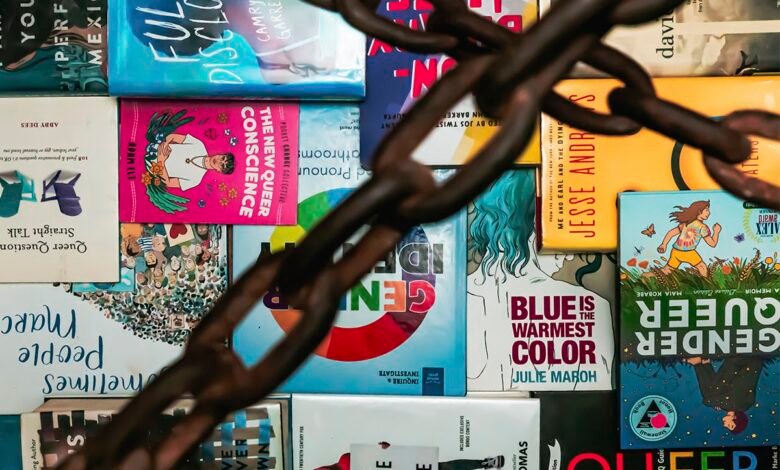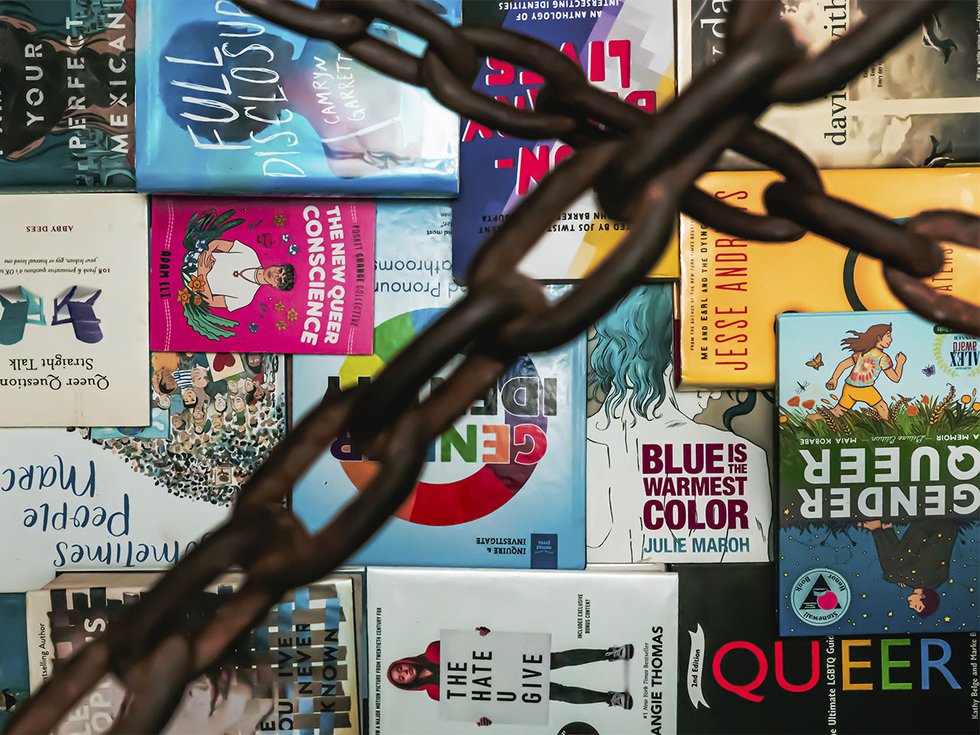More than 100 Wisconsin school districts field inquiries, challenges to books – Isthmus


More than 100 Wisconsin school districts — 1 in 4 — fielded inquiries about books or formal requests to remove them since 2020, according to a Wisconsin Watch review of records obtained from all but two of the state’s 421 public school districts.
Most requests came from organized conservative groups and politicians rather than organic requests from parents concerned about required reading. In several cases, the school district didn’t own the books someone wanted to remove.
Requesters targeted books with LGBTQ+, sexually explicit and racial content, repeatedly alleging liberal bias and anti-Christian values. Gender Queer by Maia Kobabe, an autobiographical exploration of gender and sexuality that includes sexually explicit graphics, drew the most challenges and inquiries.
Wisconsin Watch’s findings are the most comprehensive look at attempts to ban books in the state since the pandemic, when remote learning gave some parents a closer look at what their students were being taught in public schools.
Experts say Wisconsin, Pennsylvania and Michigan — among the most competitive battlegrounds in national politics — are particular hotbeds of book challenges as partisan actors use such tactics to energize their base. Tasslyn Magnusson, a Wisconsin-based program consultant with Freedom to Read at PEN America, calls Wisconsin “one of the most dangerous states for book bans.”
“They are tipping point states in the election, which means we’re going to get so much money poured in here,” Magnusson says. “The governor can veto some of this crisis legislation, but then what happens is these groups and these efforts then change policy at the local level.”
Book removals and restrictions revealed
The records from every corner of the state showed 165 unique requesters raised questions about or formally sought to remove 1,617 books across 106 Wisconsin school districts between Jan. 1. 2020, and Oct. 13, 2023. That includes 625 formal challenges.
There were 679 titles, including such classics as Slaughterhouse-Five, The Bluest Eye and The Handmaid’s Tale; bestsellers such as A Game of Thrones, The Kite Runner and Fifty Shades of Grey; but mostly requests for books about sex and LGBTQ+ themes such as I am Jazz, It’s Perfectly Normal and Queer: The Ultimate LGBTQ Guide for Teens.
Districts removed books or restricted them to older grades or parental permission in 190 instances, involving 127 titles. Most removals took place in southeast Wisconsin districts, particularly Waukesha, Kenosha, West Allis, Oak Creek-Franklin and Elmbrook.
The books All Boys Aren’t Blue, a memoir by George Johnson of growing up a queer Black man, and Lucky, a memoir by Alice Sebold involving a traumatic sexual assault, were either restricted or removed six times each, the most of any book.
Wisconsin Watch found 114 more examples of book restrictions than the list maintained by PEN America, the leading institution tracking book challenges. PEN America counts any content-based action taken against a book that leads to removals or restrictions, for any period of time, overriding the original choices of school boards, administrators and teachers. The count includes some situations in which schools later returned restricted books to shelves.
PEN America requires publicly available data to confirm book bans, such as school board minutes and local news reporting. Magnusson says far more efforts likely go untracked in rural Wisconsin, where many local newspapers no longer routinely report on school board actions.
Several districts initially charged a fee for Wisconsin Watch’s records request, but later agreed to provide the records without a charge. Two — the Superior and Oshkosh Area districts — refused to waive the charge.
Conservative groups and ‘super requesters’ lead the list
Members of organized conservative groups facilitated removal requests in at least 14 districts, and many more districts received challenges from requesters who used lists of books compiled by national political groups. The largest groups involved were Moms for Liberty, No Left Turn in Education, Mass Resistance and Parents’ Rights in Education.
In many cases, independent citizen requesters relied on lists compiled by larger national groups like booklooks.org and ratedbooks.org.
Eleven “super requesters” — those who raised concerns about or challenged 15 or more titles at a time — accounted for 73% of the targeted books. Some had no children in the district. In nearly 60 cases, the school district didn’t own the book the requester sought to remove.
At least 849 inquiries and formal challenges to books — more than half compiled by Wisconsin Watch — came from a school board member or candidate, another local politician, or someone otherwise heavily involved in local conservative activism.
The most prominent such lawmaker was Sen. Jesse James, R-Altoona, who in March 2022 asked several districts if they possessed a list of 51 books, according to his staff. The list was compiled by an Eau Claire parent who previously spoke out against COVID-19 masking efforts and equity training materials. The books addressed gender, sexual and racial identity, and some contained sexually explicit or graphic content.
“Nothing more came out of the request besides simple information gathering,” a James spokeswoman tells Wisconsin Watch by email. “We did NOT follow up with the schools after the fact about removing the books, and we did NOT pursue any legislation or oversight after the request was fulfilled.”
Conservative media fuel book ban fever
Conservative media played a role in requests for removal in at least 12 districts.
After a Sept. 3, 2023, Libs of TikTok article described concerns about several books in the Kenosha School District, social media spurred waves of removal requests throughout nearby districts.
Kevin Mathewson of the far-right blog Kenosha County Eye sent emails on Sept. 11, 2023, to two district administrators asking whether the district planned to remove four titles.
Michelle Garven, Trevor-Wilmot Consolidated Grade School District administrator, told Mathewson none of the books were available to check out at district libraries, but families could search for titles through the Wisconsin School District Library Consortium.
Mathewson wrote he was “very eager to publish a story about your sexual deviance” and added, “Don’t make me sue you and embarrass you further because when I write my article people are going to be wondering why you want kids to be exposed to pornography.”
His emails and reporting prompted Garven to send a cease and desist letter.
LGBTQ+, sexually explicit content targeted
Most books targeted for removal in Wisconsin explored themes related to identity or coming of age, with a particular focus on LGBTQ+ and racial storylines. Data from PEN America show that restriction efforts nationally overwhelmingly targeted books about people of color and LGBTQ+ individuals.
Gender Queer, the state’s most targeted book according to the Wisconsin Watch analysis, also topped the American Library Association’s national list of challenged books in 2023 and was fifth on PEN’s list of challenges during the 2022-23 school year.
The Baraboo School District in early October 2023 fielded 32 challenges to the book. District officials said they were not sure what prompted the brief surge.
Requesters claimed the book aimed to “indoctrinate,” “corrupt,” “pervert” and “deceive” children, “promote pedophilia and sexuality,” “tell children they can be queer,” and teach kids “to become pedophiles” and “sex offenders.” One requester cited Leviticus 18:22 and 20:13 as justification for the book’s removal, adding that “the Bible calls this lifestyle sinful.” Requesters said the district should burn the book and jail whoever put the book in the library.
Baraboo district officials, however, said they couldn’t find the book in their inventory. Two other districts — Kenosha and the Sheboygan Area — removed the book.
Magnusson says critics of Gender Queer tend to focus on short excerpts and discuss them out of context.
The novel’s most explicit section, frequently cited in requests, shows two characters using a sex toy to perform oral sex. The scene is “about consent and choosing not to have sex,” Magnusson notes.
“When we evaluate books just by what seems the most outrageous, we’re missing that point,” Magnusson says. “The story is about saying no and saying, ‘I don’t want to do that, that is not for me,’ and it’s actually a very valuable, caring story about learning that you can say those things in your life.”
Opponents of Gender Queer and other books targeted in Wisconsin expressed concerns that sexually explicit scenes, regardless of how little of a storyline they make up, could expose their children to sensitive topics before they’re ready. Many book restriction advocates say they would prefer that parents instead discuss such issues with children.
Books exploring race also targeted
Wisconsin is home to some of the nation’s starkest disparities between white and Black residents in education, public health, housing, criminal justice and income. But book challengers also objected to a range of books that explore issues surrounding race. Those include The Bluest Eye and Beloved by Toni Morrison and Stamped (for Kids): Racism, Antiracism, and You, an adaptation of Ibram X. Kendi’s history of racism.
The Wautoma Area School District removed student access to An American Story by Kwame Alexander in October 2023 following a challenge that called the book “very racially charged and frightening for elementary school kids” and said it “depicts Americans as being monsters to Africans.”
The novel tells the story of American slavery through the journey of a child navigating the complexities of identity amid racial tension in contemporary America.
In the decision letter, District Administrator Jewel Mucklin wrote that “not all students have the emotional or intellectual awareness to process and understand some of the images in the book or the content of the story.”
Emotional toll beyond count
An increasing part of library specialists’ and district administrators’ jobs has become dealing with requests. Records showed hundreds of internal emails related to scheduling reconsideration meetings and addressing parent concerns.
Districts’ criteria took into account a book’s alignment with curriculum and state standards, the readability and appeal of texts to diverse students, the grade-level appropriateness, the significance and reputation of a book’s author, popular appeal, and reviews from sites such as Scholastic and Common Sense Media.
“I think there’s no librarian in America right now that isn’t having some amount of emotional distress over what’s going on,” says EveryLibrary Associate Director Peter Bromberg, who has tracked bills around the country targeting librarians.
Bromberg says more teachers and librarians are leaving the profession early as a result: “There’s an emotional toll to this that doesn’t show up on a…spreadsheet of how many books are being banned.”
Wisconsin Watch is a nonprofit, nonpartisan investigative newsroom.




